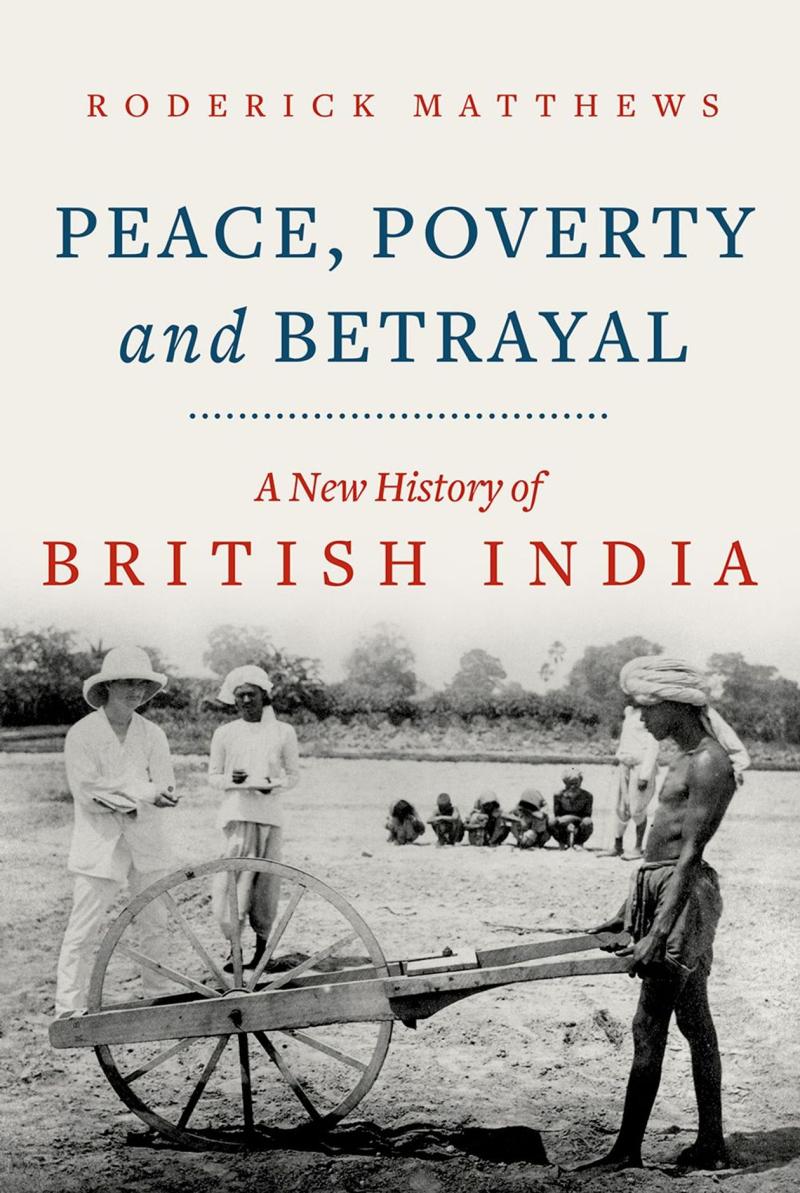'Peace, Poverty and Betrayal' Review: To Oblige and Rule
By: Tunku Varadarajan (WSJ)



As India reels from the Covid pandemic, is it wrong to ask whether independent India is really taking better care of Indians than the British Raj did? This question—yes, provocative—isn't one that Roderick Matthews poses in "Peace, Poverty and Betrayal," a book he describes as "a new history of British India." But many of his readers could be tempted to ask it as they observe present-day Indians die in the thousands from a lack of hospital beds, medicines and oxygen—dying, in fact, from the sort of callous and conspicuous dereliction of care that we've been schooled to ascribe to colonial rulers.
The pandemic is a global phenomenon, but its management within India is the job of the Indian government. In this task, alas, it appears to have fallen as scandalously short of the standards required of it as the British Raj did in 1943, when a famine killed millions in Bengal. This deadly neglect came about, in part, because the war cabinet in London, Mr. Matthews writes, "had no wish to divert ships and food from elsewhere to help relieve the distress."
Nowhere near the same numbers have died of Covid in 21st-century India, but the infection and mortality rates are just as unacceptable. Even in the midst of the pandemic, India's government steams ahead with a multi-billion-dollar vanity project to redesign the central avenue of New Delhi and build a new parliament building. Mr. Matthews, a historian whose great-grandfather was a tutor to Jawaharlal Nehru, India's first prime minister, writes that British colonialism could be "self-glorifying and arrogant." It is evident that India's elected rulers are no more self-effacing.
Independent India shares a great deal else with its colonized self. Mr. Matthews tells us that "all its principal ideals"—the rule of law, religious liberty, legal equality, freedom of expression and the protection of minorities—are "identical to those of the British Raj it replaced." Except for one, "mass democracy," a new ideal for India at odds with the political logic of colonialism. But, Mr. Matthews notes, the right to vote came at a price. Fearful of domination by a Hindu electoral majority, the Muslim elites of India engineered their breakaway state of Pakistan.
The British ruled in India from 1765 to 1947, and Mr. Matthews writes that "rich, powerful Indians" were "complicit every step of the way." He invites Indians to acknowledge that "it is inconceivable" that British rule could have lasted so long without serving the interests of the Indian elites, which retained their social influence and wealth. "Almost uniquely in world history," he notes, "the British conquest of India involved very little change in the ownership of land—at least from conquered to conquerors."
After the taxed but unrepresented American colonists booted out the British—whose then-ascendant Whiggish belief held that governance was best left to a benign aristocracy—the East India Co. assumed a more liberal approach in the Indian territories it had conquered. Diluting their instinctive Whiggishness, the British courted the emerging Indian middle class and encouraged the spread of Western ideas. This “intrusive modernizing agenda”—of “civilizing” the Indians—offered a perfect justification for the British presence in India.
Mr. Matthews’s discerning book isn’t a revisionist defense of the Raj. It is, instead, a warning against the glib postcolonial assumption “that because British rule is viewed as bad, therefore anything else would have been better.” The British, he points out, spent much more time uniting than dividing India, which would have collapsed into a state of “warlordism” had the British not welded it into a unit for the first time in history. The delusion of a united pre-British India, adds Mr. Matthews tartly, was the “only mystical belief” that the irreligious Nehru ever allowed himself.
The freshness of Mr. Matthews’s book lies less in his evaluation of Britain’s impact on Indians than it does in his account of India’s impact on the British. “Taking on government in India had a much deeper effect on Britain than is usually acknowledged,” he writes, adding that Britain’s Indian encounter was one of the four most important “socio-political milestones in British history.” The others were, by his reckoning, the Norman Conquest, the Black Death, and the Civil War of the mid-17th century.
The Indian connection, he asserts, “thrust genuinely new elements into national life” in Britain and “stimulated the introduction of modern political accountability.” A range of British philosophers—Edmund Burke, Adam Smith, John Stuart Mill, Henry Maine—“were all heavily shaped by Indian issues.” Mr. Matthews points out that many latter-day institutional developments in Britain made their debut in India. Examples include a full-time paid police force, education as a state obligation, the use of competitive exams for public-service recruitment, and even a codified criminal law.
In Mr. Matthews’s telling, the Indian Mutiny of 1857 was the event that wrecked the British colonial enterprise. Shaken by the violence, the British abandoned their appeasement (as they came to see it) of the reformist bourgeoisie and offered their backing to the “Indian conservative classes”—large landlords and princes who promised loyalty (and money) to the Crown. The emasculation of the politically ambitious urban centers of Bombay, Madras and, most important, Calcutta was easily done, and done with relish.
In the decades after 1857, British rule sought to withhold political rights from Indians, a sliding back into a Whig mode more suited to the late 18th century. This denial led to the movement for independence—spearheaded by Mohandas Gandhi and Nehru—even as the Raj sputtered on into the mid-20th century. At Independence in 1947, writes Mr. Matthews, India had to free itself from “not one but two outdated political systems”—a colonial superstructure resting on an Indian feudal base that rejected modernity. The British are now consigned to India’s past. But as the Covid calamity reveals, India’s rulers are still unable to treat its people with the dignity they deserve.
Mr. Varadarajan, a Journal contributor, is a fellow at the American Enterprise Institute and at New York University Law School’s Classical Liberal Institute.

Tags
Who is online
48 visitors


One could make the argument, at least in the case of India, that the colonized benefited more than the colonizer.
It sounds like a book worth reading.
The Book is:
PEACE, POVERTY AND BETRAYAL
By Roderick Matthews
Hurst, 432 pages